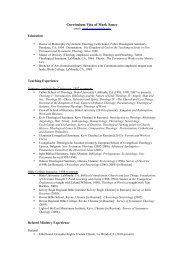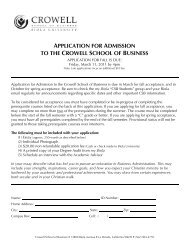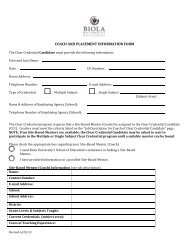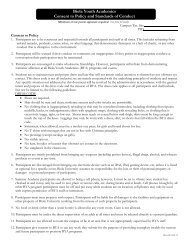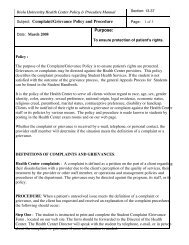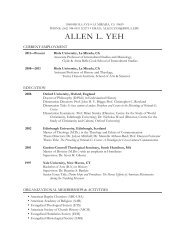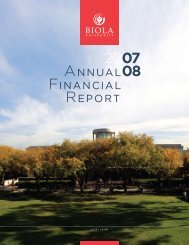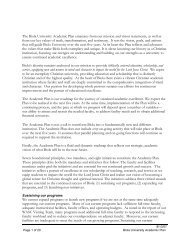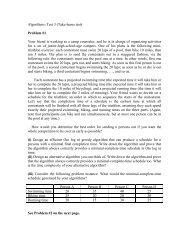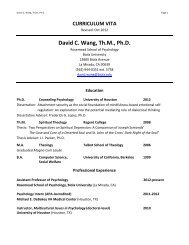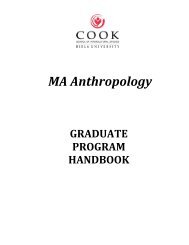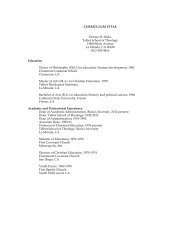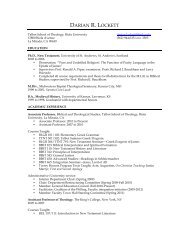Create successful ePaper yourself
Turn your PDF publications into a flip-book with our unique Google optimized e-Paper software.
Independent Theological Studies<br />
These independent study courses offer lectures on cassette tapes by<br />
outstanding biblical scholars. They are available only as electives or<br />
prerequisites for degree-seeking Talbot students. Students who experience<br />
unresolvable scheduling problems previous to graduation<br />
may use them to meet their requirements. They may not normally<br />
be used in lieu of required courses. The use of ITS courses is limited<br />
as follows:<br />
Elective Units or Unresolvable Scheduling Problem<br />
Master of Divinity........................................................................................................... 5<br />
Master of Arts ................................................................................................................... 4<br />
Master of Arts reduced (Any Master of Arts reduced program) ....... 2<br />
Courses include a printed syllabus which provides a broad outline<br />
of the lectures, review questions and a bibliography. Requirements<br />
for credit include textbook assignments, collateral reading, research<br />
papers and examinations, all of which are outlined in a programmed<br />
syllabus.<br />
Regular tuition fees are charged for each course regardless of the<br />
number of units for which a student is already enrolled and include<br />
costs of tapes and programmed syllabus. Tapes must be ordered<br />
through the Dean of Faculty Office.<br />
Students who desire graduate credit for ITS courses must meet the<br />
normal requirements for admission to Talbot and register for the<br />
courses through the Admissions and Registrar’s Offices.<br />
Further details may be obtained from the Dean of Faculty Office.<br />
Courses<br />
o l d t e s ta m e n t s t U d I e s<br />
Courses listed under this heading which have exegetical content<br />
(and thus language prerequisites) are specifically identified; other<br />
courses are expositional in nature and content.<br />
ttts 501 The Pentateuch ........................................................................2<br />
R. Laird Harris, Ph.D.<br />
A critical introduction to the first five books of the Bible.<br />
Examination of such subjects as the problems of Genesis 1-11,<br />
Higher Criticism of the Pentateuch, chronological issues, and<br />
the archaeological and cultural background of the Penta-<br />
teuch.<br />
ttts 502 Conquest and settlement ....................................................2<br />
John J. Davis, Th.D.<br />
A study of the conquest and settlement period in Israel’s<br />
history from the perspective of archaeology, theological<br />
truths and history. The books included are: Joshua, Judges and<br />
Ruth. Special consideration of Late Bronze Age materials from<br />
Palestine which provide insight into the cultural background<br />
for this era.<br />
ttts 503 The united monarchy ............................................................2<br />
John J. Davis, Th.D.<br />
An historical, archaeological and theological analysis of<br />
the period of the United Monarchy in Israel. Archaeologi-<br />
cal discoveries from the Iron Age I period cited to illustrate<br />
important cultural trends of this era. Particular attention given<br />
to the books of I and II Samuel, the first ten chapters of I Kings,<br />
and the parallel passages in Chronicles and Psalms.<br />
ttts 504 The Divided monarchy ..........................................................2<br />
John C. Whitcomb, Jr., Th.D.<br />
The history of Israel from the beginning of Solomon’s apostasy<br />
(I Kings 11) — about 950 B.C. to the Babylonian Captivity (II<br />
Kings 25) in 586 B.C. Special emphasis given to the miracle<br />
ministries of Elijah and Elisha. Parallel passages from the<br />
Chronicles and the prophetic books scrutinized, as well as<br />
evidence from contemporary secular history.<br />
ttts 5<strong>05</strong> The Book of Psalms .................................................................2<br />
Bruce K. Waltke, Th.D., Ph.D.<br />
An introduction to the book of Psalms with emphasis on the<br />
principles involved in the exegesis of hymnic literature as well<br />
as application of these principles to selected portions.<br />
ttts 506 understanding the old Testament ...................................3<br />
Bruce K. Waltke, Th.D., Ph.D.<br />
A survey of the history of salvation in the Old Testament espe-<br />
cially as it relates to the universal of Old Testament theology,<br />
i.e. the rule of God or the establishment of God’s kingdom<br />
upon the earth. A working knowledge of Hebrew considered<br />
to be helpful but not required for this course.<br />
ttts 5<strong>07</strong> The Book of Proverbs .............................................................4<br />
Bruce K. Waltke, Th.D., Ph.D.<br />
An exegetical study of the Book of Proverbs in both its cultural<br />
and historical setting and its literary setting with attention to<br />
its critical and hermeneutical problems. To get the full benefit<br />
out of the course, a knowledge of Hebrew is required for<br />
seminary credit.<br />
ttts 509 The Christian & old Testament Theology .......................3<br />
Walter C. Kaiser, Jr., Ph.D.<br />
A biblical and theological study of the foundational theology<br />
applied by the Old Testament for the New Testament and the<br />
Christian Church. This study identifies and inductively derives<br />
the center or focal point for the theology of both the Old and<br />
New Testaments. It also deals with the amount of continuity<br />
and discontinuity between the Old and New Testaments.<br />
Included are the topics of saving faith, the people of God,<br />
the role of the law of God, the worship of God, the doctrine<br />
of atonement, relationship between the law and wisdom<br />
theology, kingdom of God, the Messiah, the inclusion of the<br />
Gentiles, the theology of the Holy Spirit and the preparation<br />
of the new covenant.<br />
20<strong>05</strong> – 20<strong>07</strong> C ATA LO G Talbot School of Theology 255



